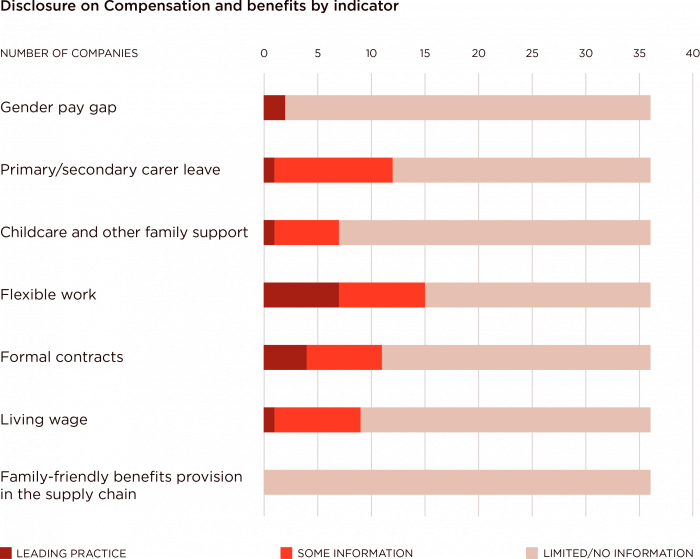Measurement Finding
Compensation and benefits
This measurement area considers the fair compensation of women.


Twenty-four companies (67%) disclose some information on the compensation and benefits they offer either employees or supply chain workers.
In the workplace, only two companies publicly disclose their gender pay gap for global operations. The indicator with the highest disclosure is flexible work, though fewer than half of the companies (15 companies, 42%) report on their flexible working locations or hours. There is limited information on primary and secondary carer leave, childcare and other family support. Most companies mention benefits with regards to companies’ headquarters rather than global operations and focus on childcare, with limited reference to elderly care.
In the supply chain, less than one third of the companies (11 companies, 31%) indicate that they require suppliers to extend formal contracts to their workers. Nine companies (25%) make a reference to providing a living wage to workers, either in the form of monitoring or supportive actions, but only three companies require their suppliers to do so. No information was found on family-friendly benefits provision in the supply chain, which evaluates whether companies require their suppliers to provide primary and secondary carer leave, childcare or other family support.
19. Gender pay gap
Several companies (13 companies, 36%) report on their gender pay gap, for their UK operations only, where it is required by law, without disclosing information on their global operations. Only 2 companies, Inditex and Lojas Renner, publish gender pay data. Inditex publishes the gender pay gap across its operations and explains its methodology and provides geographical analysis and publishes by pay band. Lojas Renner reports on the difference of base salary compensation between women and men employees across its senior leadership, leadership under senior manager, and non-leadership positions.
No company publishes gender pay data that includes financial benefits, such as insurance benefits, bonuses, retirement contributions, or on whether the pay analysis was verified by an external party. Neither were details found on whether any company is taking concrete steps to address any pay gaps.
20. Primary and secondary carer leave
Only three companies (Amazon, Kering and L Brands) have a global policy of offering at least 14 weeks of paid leave to primary carers, as recommended by the International Labour Organization while seven companies (Amazon, Carter’s, Kering, L Brands, Ralph Lauren, Target and Urban Outfitters) offer at least the recommended two weeks of paid leave for secondary carers. Amazon offers the highest number of weeks for maternity leave, 20 weeks of paid leave, as well as extends 6 weeks paid leave to non-birth parents. It also implements actions to promote the return to work and retention of workers after primary carer leave.
Only three companies (Inditex, Lojas Renner and Ralph Lauren) monitor the return-to-work rate of employees after primary carer leave and only two companies (Inditex and Ralph Lauren) track the number of workers who take secondary carer leave.
21. Childcare and other family support
Seven companies (19%) offer family support with all of them focusing on childcare support and access to childcare facilities: Adidas, Amazon, Fast Retailing, L Brands, LVMH, Nike and Target. For example, Target provides backup childcare solutions and 20 days of childcare support through the Bright Horizons childcare to all employees at its stores and distribution centres as well as at its headquarters.
22. Flexible work
Seven companies (19%) offer their employees the possibility to vary their working schedules by offering flexible working hours and the location of their work: Adidas, Aditya Birla Fashion and Retail Limited, Associated British Foods, Fast Retailing, Kering, PVH, and Ralph Lauren.
23. Formal contracts in the supply chain
Seven companies (19%) require that their suppliers employ workers through formal contracts. Four companies (Amazon, Associated British Foods, Fast Retailing and Marks and Spencer Group) require that their suppliers employ workers through formal contracts and take specific actions to ensure its suppliers support formal rather than informal work.
24. Living wage in the supply chain
Only three companies require their suppliers to pay a living wage to their workers: Decathlon, Inditex, and Kering. While 15 companies make a reference to living wages in their supplier codes of conduct, either recognising workers’ rights to a living wage or encouraging suppliers to progressively realise a living wage, they only require suppliers to pay their workers the legal minimum wage or industry standard.
25. Family-friendly benefits provision in the supply chain
No publicly disclosed information was found on whether companies require their suppliers to provide primary and secondary carer leave, childcare or other family support. Adidas is the only company that makes an explicit reference to maternity leave for workers and states that best practice would be providing three months leave at the worker’s current wage level.
